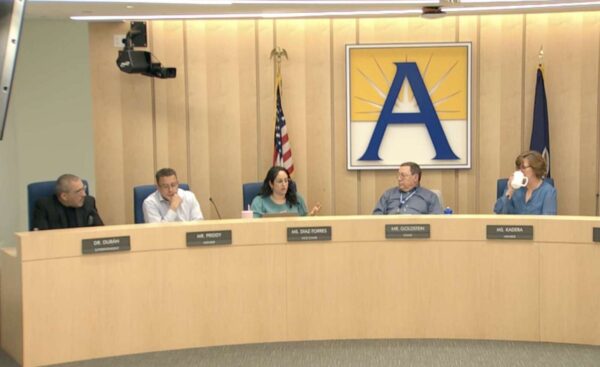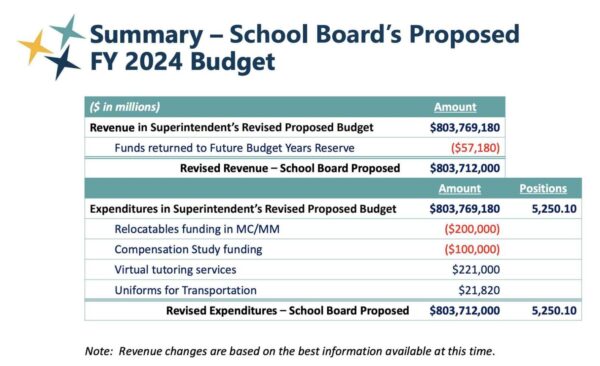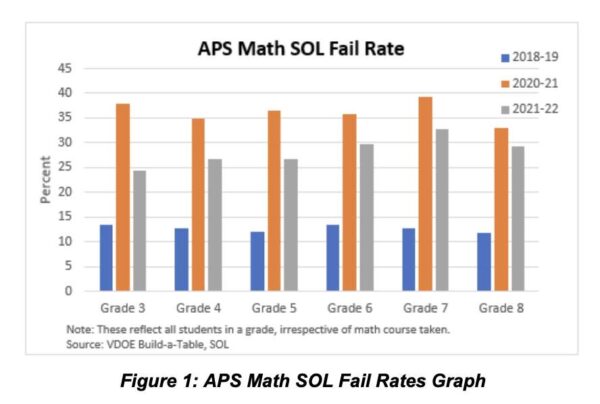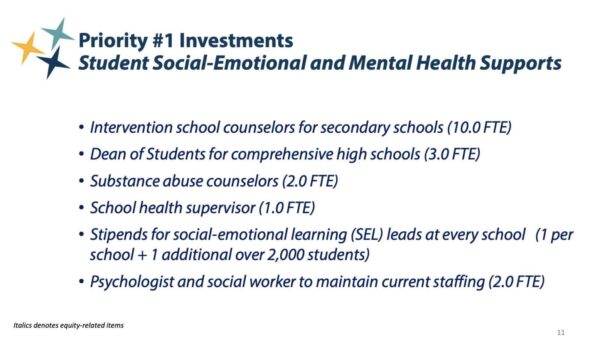
With a few minor revisions, the Arlington School Board adopted the superintendent’s budget recommendation as its own proposed budget last week.
Their approval came with the caveat that the $803.7 million budget could change between now and the final approval, which is set for a future School Board meeting on May 11.
The changes last week added more funding for virtual tutoring and uniforms for bus drivers and reduced funding for trailers and a compensation study by a total of $300,000.

Board Chair Reid Goldstein signaled that members have the next month to smooth over “many items that we were not able to come to a consensus on.”
“In many past years, the School Board’s proposed budget gave a good indication of what the final budget will look like. That may not be the case this year,” he said. “I cannot say there will be radical changes between this proposed and the final on May 11, but I also can’t say there will be minimal changes. I just have to say we are continuing to work on it.”
He is concerned that Superintendent Francisco Durán’s budget relies on $40 million in reserve funds, an emerging trend giving other board members and school staff pause, too.
“Besides the concern that those reserve buckets may not be able to be refilled, there’s the fact that that puts us in a $40 million hole when we start the budget process next year,” Goldstein said.
Next fiscal year, APS could use years of savings from a number of sources, including unfilled positions, to fund cost-of-living adjustments and salary increases for all staff.
Durán told the Arlington County Board on Friday this aligns APS with Gov. Glenn Youngkin’s proposed budget and makes the school system’s compensation scale more competitive with nearby districts.
County Board Chair Christian Dorsey said it is “a reasonable choice to use savings in personnel on personnel that you actually have.”
“I can tell you, anecdotally, [Assistant Superintendent of Finance and Management Services] Leslie Peterson is worried, if that tells you anything,” Board Vice-Chair Cristina Diaz-Torres replied.
“This has been an ongoing discussion for many, many years, in the sense that we have had a habit of needing to use reserves in order to cover for core instruction in the past,” she added, noting the proposal leaves APS with $17 million in reserves “to sustain us for any ongoing overages for next year.”
Durán pointed out more than 55% of the reserves used comes from compensation reserves, which are replenished annually with savings from unfilled positions or new hires, who earn less than the longer-tenured staff they replaced. That money is earmarked for future compensation spending.
“It’s been a practice for us to separate that out and show the public and show our staff that all the money coming from lapse and turnover at closeout is going to be dedicated toward compensation reserves,” he said.
Another tradeoff board members face is when to add positions such as math coaches and psychologists to support students struggling the most in math or with social-emotional needs.
Last November, in response to higher rates of students failing standardized math tests, a math advisory committee recommended that 34 math interventionists and at least seven coaches. The proposed budget includes a fraction of that.
School Board watchdog group Arlington Parents for Education (APE) has urged the board to add all of the recommended math support staff and increase funding to help respond to learning loss attributed to the pandemic.
“APS has continually missed opportunities to meaningfully resource and prioritize learning loss,” the group said in a letter to the board. “Simply put, the opportunity to address the impacts of a once-in-generation crisis is narrowing.”
“We urge the School Board to act more boldly to address the significant academic and mental health needs of our students,” APE’s letter continued. “Public schools around the nation are responding to this like the crisis that it is. APS must do the same.”

APS currently has six grant-supported positions, two of which are stationed full-time at two elementary schools. The current budget proposes adding four more, for a total of 10, across elementary and middle schools.
In a March work session, School Board member Mary Kadera pointed out that despite urgent social-emotional needs, APS is punting on adding psychologists and social workers until it completes a study of the formulas used to fund school budgets, dubbed “planning factors.”
Adding these positions now could ensure students could get support sooner while waiting on hiring for some positions could give APS more funds to afford to implement more recommendations.
“I am feeling uneasy that we’re not talking about increases in social workers and psychs,” she said. “When I hear from them about their level of distress, it’s really concerning me.”

On Thursday, members of the School Board agreed not to adopt a budget that deviated substantially from Durán’s proposal, given the absence of School Board member Bethany Zecher Sutton, who could not attend last week’s meetings.
Present Board members highlighted their top priorities for future discussion, such as printed report cards and family leave.
APS added 10 days of paid parental leave in 2016 but reversed the decision two years later to balance the budget. In addition, current leave policies differ for teachers, who are 10-month employees, and administrators, who are 12-month employees, Yorktown High School physics teacher Deborah Waldron told the School Board in February.
APS is a fantastic place to work, if you’re a 12-month employee. Twelve-month employees are paid on a 260-day contract, yet for instance this year, there are 31 paid holiday days, meaning they are only working 229 days — 88% of their work days. Plus 12-month employees are given, as they should, a minimum of 14 days of annual leave, meaning that they could potentially be working 215 days of a 260-day contract — that’s 83% of the time.
I am paid on a 200-day contract. I’m not paid for Spring Break, I’m not paid on holidays, I’m not paid on Winter Break and on Thanksgiving break. I am paid the 189 days that I am in the building teaching and doing [professional development]. I have another five days of floating hours that I work — I work 194 days of my 200-day contract. That’s 98%.
Also top of mind for Kadera is the budget’s long-term sustainability.
“This spring, I’d like to have a robust conversation about three things: First, cuts we can make in this year’s budget; second, putting in place a formal, disciplined approach to looking at [return-on-investment] on our existing expenditures; and third, our willingness and capacity to seek additional funding through grants, corporate partnerships and other means,” she said.

